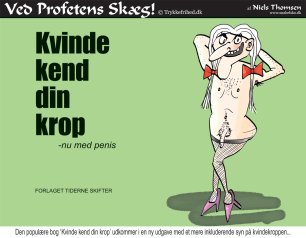However, in a March 7 op-ed piece in the Copenhagen daily Berlingske Tidende, the entrepreneur, social commentator and Member of the International Free Press Society's Advisory Board, Asger Aamund, writes: "It is all well and good to have an International Women's Day but shouldn't we set our priorities according to importance and need? Today there are several hundred million Muslim women with fewer civil rights and liberties than women had obtained in classical Rome 2000 years ago."
I couldn't agree more. It is of vital importance that we publicise this blatant inequality, especially in view of the fact that a troubling and dangerous trend appears to be making headway among politicians and opinion leaders alike, namely that it has become a near taboo to identify and debate the negative sides of Islam. Hardest hit are young Muslims, who are left more or less defenceless.
Ostrich-like Evasiveness
The worst result of the taboo against debating is that a great number of social problems are swept under the rug. In reality we are experiencing a sort "Islamophobia" manifesting itself in an ostrich-like fear of facing facts when it comes to Islam. One outcome is the contention that so-called honour killings are caused by jealousy as the Danish daily B.T. hinted at with its headline on December 17, 1007, "When Jealousy Kills". The article revealed that several of the victims had a Muslim background.
The Chief Editor of the daily Ekstra Bladet, Poul Madsen, provided another example with a leading article dated January 24, 2010, where he set forth the remarkable claim that only two honour killings have been committed in Denmark.
According to the two newspapers, the problem is almost non-existing and unfortunately this attitude has spread with alarming consequences for young Muslims trying to carve out a free existence. It has consequently become increasingly common to hear the claim that "Oh well, Danish men also commit murder as a result of jealousy".
Family Executions
Unfortunately they do and increasingly so. However, a review of the 26 registered cases of so-called honour killings in Denmark over the period 1986-2008 that have come to the public's attention shows a quite different background than jealousy. Some of them are regular family liquidations of young people who refuse to obey family orders, the others are murders of women whose husbands or boyfriends will not accept that they lead a Danish way of life in violation of Islamic principles.
Of all the cases that have resulted in convictions, jealousy has only been alleged in one instance, i.e. in a case from 1994 when a 42-year-old Iraqi man killed his 22-year-old wife with three blows of an axe.
Regarding the other cases, a rough summation indicates that 11 were regular family liquidations and 14 murders of women whose husbands or boyfriends explained to the court that they could net accept their partner's Danish way of life in contravention of the Islamic view of women.
Among the typical family liquidations is a case from 1986 in town of Horsens, where a 16-year-old Turkish boy with a 15-year-old Turkish girlfriend was killed in his apartment. The boy's mother was also killed with gunshots. The killer was the girl's father, who had promised his daughter to a man in Turkey.
The Case of Ghazala Khan
Another typical instance of family liquidation was the 1993 murder of a 25-year-old man in Copenhagen. He wanted a divorce from his Pakistani wife and was consequently murdered with 25 stabs from knives wielded by his wife and her brother, who proceeded to cut off the head and testicles from the corpse. The body was wrapped in plastic bags and thrown into the mote next to the neighbourhood of Christiania. The head ended up in the water at Kalvebod Brygge.
Three years later, in 1996, a 20-year-old Pakistani woman was murdered in the municipality of Frederiksberg by her three brothers because she refused to live in a forced marriage. The following year the same happened to another 20-year-old Pakistani woman. She had refused to enter into a forced marriage with her cousin and had her throat cut by her elder brother while her husband and several members of her family were watching.
And so it goes. One case after another that has nothing to do with jealousy but must be described as regular family liquidations.
The most spectacular case occurred in 2005 when 18-year-old Ghazala Khan was shot in the street by her elder brother because she had married the man she loved against her family's wishes. Her husband was severely wounded. The couple was attempting to escape from the family but was hunted down with the help of Muslim taxi drivers. Nine persons were convicted of the atrocity including the girl's 57-year-old father, who had planned the murder and received life imprisonment.
These religiously motivated killings of women that have become too Danish follow the same brutal pattern as evidenced by, e.g., a case from 1996 where an Iraqi husband stabbed his 25-year-old Syrian wife to death in front of bus passengers on the island of Amager just outside Copenhagen. In court the perpetrator calmly explained that he could not accept her Western way of life. Therefore she had to die.
The Danish Way of Life and Muslim Norms
This was also the explanation given by an Iranian shopkeeper after killing his 29-year-old Iranian wife in his store in 1999. He drove the body to a forest in Ejby close to the town of Køge and burned it beyond recognition. In court he declared that he was unable to accept her Danish life style.
That same year a 19-year-old Turkish-Danish girl was killed by her Turkish husband, who had been given entry to the country as result of the Danish programme of family reunification. To the judges he explained that he could not bear that his wife lived according to Danish standards and in contravention of Muslim rules.
In 1999 Naima Fadio was married to her "reunified" husband but the marriage only lasted five weeks until he became tired of her Danish ways and stabbed her to death.
I could go on with one brutal and bestial account after another of the murders of women. Accounts that have nothing to do with jealousy but everything to do with Islamic misogyny.
The wrath of Islam also became the bane of Danish-Iraqi Sonay Mohammad at the tender age of 14. In 2002 she was found drowned in Præstø harbour with a blow to the back of her head. The autopsy showed that she was alive but unconscious when she was thrown into the water. Sonay was murdered by her father because she too had taken to Danish ways of life. Her parents had found a picture of a Danish boy in her wallet. When she was 12, her father had tried to strangle her with an electric cord while her mother egged him on.
Means of Escape and Fundamentalist Imams
This is only the top of the iceberg. For young Muslims seeking to integrate into Danish society and insisting on their right to choose their own lovers and spouses, the situation has become so precarious that the National Organisation of Refuge Centres for Women, LOKK, is preparing a safety guide for young Muslim women. Here they are advised to keep an extra cell phone with them at all times without the knowledge of their parents. It may come in handy if they are sent for seemingly innocent visits abroad – visits that too often end in forced marriages.
For the same reason the guide will also contain information on ways to escape and addresses and phone numbers of Danish embassies in a number of countries where the girls may seek protection. On May 1, 2010 LOKK opens a new crisis centre providing refuge for Muslim couples trying to escape from their families. The offer is also open to couples of mixed Danish-Muslim background.
We choose to close our eyes to their plight and we employ fundamentalist imams like the convert Abdul Wahid Pedersen and other orthodox Muslims as advisors on integration.
We refuse to talk about the victims as that is considered deeply reactionary and consequently taboo. We will rather follow Ekstra Bladet's editor Poul Madsen and play down the problem.
Islamophobes and Multiculturalists
Unless we toe the line, we are told, we will spoil our multicultural idyll. This idyllic notion, however, has turned out to be the greatest impediment to the integration of young Muslims into Danish society.
I recently took part in the Danish TV show Deadline's debate on the so-called honour killings. As an expert in this area the hosts had invited Kim Kliver, who the chief of the police's special task force on honour-related crime.
Quite in line with the current unwillingness to face facts, Kim Kliver maintained that "the number [of honour killings] is not very important". I wonder if the victims' sisters, mothers, friends and children, many of whom have been innocent witnesses to the killings, agree with this opinion.
In all its horror, Kliver's statement shows how bad the situation is. Double standards not only abound among politicians and opinion leaders but are alive and well among certain young female immigrants who claim that their objective is to help their less fortunate sisters.
Among them is the nurse and social worker Kristina Aamand, who has published a book entitled Mødom på mode [Virginity en vogue] and who has started a website for young Muslim girls encouraging them to take control of their own bodies.
When my fellow member of the Danish People's Party Jesper Langballe tried to open a debate on honour killings and quoted Kristina Aamand's work, she let it be known that "she would not allow herself to be taken hostage by various political positions".
Kristina Aamand does not appear to be quite as sensitive if the debate takes place within a Muslim context. In early April 2010 she participated in a discussion with imam Abdul Wahid Pedersen. The theme of the meeting was "Virgin at any price?"
According to the daily Information, this controversial imam had advised parents at a Somali school that the so-called "little cliterodectomy" (where the outer layer of the clitoris is removed) had no harmful influence on marriage. This did not, however, appear to faze the young social worker.
So this is the reality in Denmark anno 2010 regardless of whether or not Islamophobes dare to confront Islam's brutal view of women. We are in a situation where young Muslim women attempt to carve out an existence free of religious constraints. Yet we put obstacles in their way and abandon them.
If one tries to call attention to the plight of minority women and in particular that of our Muslim sisters, one is accused of ruining the multicultural idyll we are supposed to enjoy. This conspiracy of silence is well on its way to becoming the biggest obstacle to the integration of young Muslims.
Have a nice 8th of March.
Jette Plesner Dali is a commentator, writer and a doctor's secretary. She is a Board Member of The Free Press Society. In 2008 she contributed to the anthology "Maskeret tvang" [Coercion in Disguise], which dealt with the condition of Muslim women.
This article was previously published in Danish at sappho.dk
Honour Killings - the Forbidden Debate

Today we celebrate the 8th of March, International Women's Day. It comes at a time when improvements in women's social conditions – such as better maternity leave – appear high on the agenda. Our new Minister for Gender Equality, Lykke Friis, is naturally concerned and characterises women as a very important resource that should not be neglected.
Der er lukket for flere kommentarer til dette indlæg



